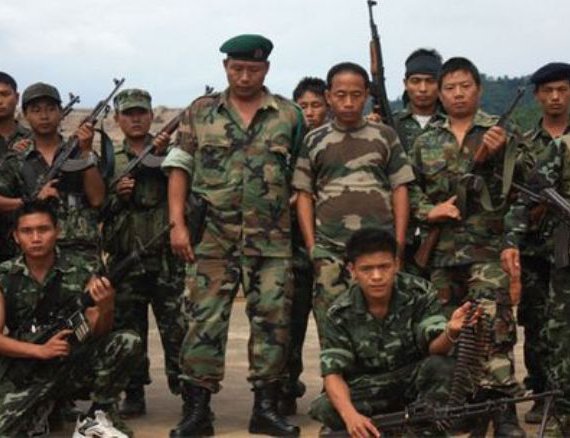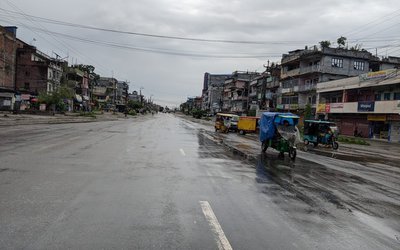
In its no holds barred tussle with India to corner the latter militarily and politically, and reduce its political and economic stature in its own backyard - South Asia - China has revealed plans to stoke disaffection in India's troubled North-East. writes P.K.Balachandran in www.southasianmonitor.com
That the North-East has been India's soft underbelly since the early 1960s has come in handy to Chinese policy makers. It is clear that China's aim is to revive or freshly create, separatist and insurgent movements in Sikkim, Bhutan, North Bengal, Assam, Nagaland and Manipur. This is beside the fact that China is claiming a whole Indian State, Arunachal Pradesh, as being part of Tibet, an autonomous Chinese province.
China is very familiar with India's North-East, as it had earlier supported Naga, Mizo and Manipuri insurgents, selling small arms such as assault rifles, machine guns, grenades and IEDs. China's state-run NORINCO arms manufacturing company had sold weapons worth hundreds of thousands of US dollars to North-Eastern insurgent groups via agents in Thailand, #Myanmar and Bangladesh' Cox's Bazaar.
Stepped up action on the part Indian military and some deft political moves by successive rulers in New Delhi had curbed militancy to a great extent over the years. But the embers of revolt and alienation remain and can be stocked by a powerful and determined neighbor. And China is equipped to do this, given its financial and military might and the international clout it has recently acquired.
No Longer A Secret
It was in the context of the on-going conflict over the border between the Indian protectorate of #Bhutan and the Tibet region of China, that Beijing fired the first warning shot to indicate its plan to foment trouble in India's North East.
In an editorial on July 5, a Chinese Communist Party organ, Global Times said: 'India has startling control and oppression over Bhutan, and as a result, #Bhutan has not established diplomatic ties with its neighbor #China or any other permanent member of the UN Security Council. Through unequal treaties, #India has severely jeopardized Bhutan's diplomatic sovereignty and controls its national defense.
'India imposed a similar coercive policy on Sikkim before. The small neighbor's revolts over sovereignty in the 1960s and 1970s were brutally cracked down on by the Indian military. New Delhi deposed the king of Sikkim in 1975 and manipulated the country's parliament into a referendum to make Sikkim a state of India.'
'The annexation of Sikkim is like a nightmare haunting Bhutan, and the small kingdom is forced to be submissive to India's bullying.
After independence, New Delhi inherited the brutal colonial policies of Britain and pursues regional hegemony at the sacrifice of tiny Himalayan nations.'
Coming to the on-going border dispute involving Bhutan, Sikkim, India and China, Global Times said: 'New Delhi's regional hegemony is boldly shown by the border face-off this time. Using the excuse of helping Bhutan protect its sovereignty, India brazenly obstructs China's road construction in Chinese territory.'
'China's construction site is near India's Siliguri Corridor, a vital path to the country's (India's) turbulent northeast area. Suspicious of the potential threats the road construction poses to the corridor, Indian troops crossed the border to the China side and obstructed our road construction.'
And then the editorial went on to warn: 'New Delhi's regional hegemony is swelling to a tipping point. The country has to pay for its provocations.'
Then in a appeal to the international community it said: '
The world should pay attention to New Delhi's bullying of tiny Himalayan countries. The international community must be aware of Bhutan's dilemma and prevent India from oppressing this small kingdom.'
And China should lead the international community in this matter, the official organ added.
'China should lead the international community in restoring Bhutan's diplomatic and defense sovereignty. Unfair treaties between India and Bhutan that severely violate the will of the Bhutanese people should be abolished. China needs to put more efforts into establishing diplomatic ties with #Bhutan at an earlier date as well.'
On Sikkim
Turning to Sikkim, Global Times says: 'Beijing should reconsider its stance over the Sikkim issue. Although China recognized India's annexation of Sikkim in 2003, it can readjust its stance on the matter. There are those in Sikkim that cherish its history as a separate state, and they are sensitive to how the outside world views the Sikkim issue. As long as there are voices in Chinese society supporting Sikkim's independence, the voices will spread and fuel pro-independence appeals in Sikkim.'
'In the past, China was wary of India playing the Dalai Lama rd, but this cardis already overplayed and will exert no additional effect on the Tibet question. But if Beijing adjusts its stance on India-sensitive issues, it could be a powerful card to deal with New Delhi.'
'With certain conditions, Bhutan and Sikkim will see strong anti-India movements, which will negatively affect India's already turbulent northeast area and rewrite southern Himalayan geopolitics.'
Prospects of Trouble
China may have chosen the wrong target to start with. There is little or no chance of its succeeding in its designs in Bhutan because #Bhutan is now internationally recognized as the 'happiest' country in the world. There isn't even a faint sign of opposition to #India in Sikkim. But the rest of the Indian North East is a different kettle of fish. This area has been India's soft underbelly since the early 1960s.
The North-East has been inherently unstable because of its mind boggling ethnic diversity; a consistent lack of good governance; continued under-development; unmitigated deficiency in democracy; and dogged continuation with unsustainable territorial boundaries.
Gorkhaland
In the Darjeeling-Kalimpong area of North Bengal, only 440 kms from the India-China border, there has been a sustained agitation for a separate Gorkhaland for the Nepali-speaking Gorkhas.
Recently, the agitation took a violent turn again, leading to the blockade of National Highway 10 and a loss of INR 600,000 million to Sikkim which depends on NH 10 for its very survival. The Gorkha agitation was trigged by a West Bengal government order making Bengali compulsory in all schools. The order has been withdrawn, but the stir for Gorkhaland continues.
The Gorkha Jana Morcha (GJM) is still boycotting the Gorkhaland Territorial Administration (DTA) on the grounds that the DTA lacks adequate financial and administrative devolution. Darjeeling is a major tourist attraction and tea producer, but the locals feel that they do not get a legitimate share of income. The area remains undeveloped.
Nagaland
In Nagaland, peace was restored to a large extent after the Indian government and the National Socialist Council of Nagaland-Isak Muivah (NSCN-IM) group signed a Framework Agreement in 2015. But the rival faction, NSCN-Khaplang (NSCN-K), is continuing the armed struggle.
While the Armed Forces Special Powers Act (AFSPA) gives sweeping powers to the Indian Security Forces (to arrest at till and torture the locals), the indifferent administrative machinery enables the militants to extort money from locals and traders from outside. Dimapur is notorious for extortion rackets.
Manipur
In ethnically mixed Manipur, the minority Christian Nagas are up in arms again, after the Manipur government, dominated by the Hindu Meitis, created seven new districts, effectively reducing the representation of Nagas in the State Legislature.
Assam
In Assam, the Bodos, led by the National Democratic Front of Bodoland – Sangbijit (NDFB-S), is waging an armed struggle for a separate Bodoland state with weapons sold by China's NORINCO. While the United Liberation Front of Assam (ULFA) led by Anup Chetia is talking to New Delhi for a peaceful settlement of the Assamese independence movement, the rival faction led by Paresh Barua is against any compromise on Assam's 'sovereignty'.
Assam feels that #China is making its main river, Brahmaputra, go dry by building several dams to generate electricity upstream in Tibet. Arunachal Pradesh and Assam have expressed dismay that in India-China talks, New Delhi, obsessed with China's position on Pakistan-based terrorist Masood Azhar and India's joining the Nuclear Suppliers Group, does not take up the river water issue with Beijing.
Arunachal Pradesh
Arunachal Pradesh has a unique problem with #China in as much as the latter claims it as being part of Tibet. And Beijing gets wild when the Dalai Lama visits the state.
Jehadi Threat
With an India-friendly Sheikh Hasina government in Dhaka, Bangladesh is helping #India curb Jehadi activity in West Bengal and the Chars. The Jamayat-ul-Mujahidden Bengal (JMB) was operating in West Bengal from 2009 to 2014 under a Bangladeshi infiltrator, Soheil Mahfuz, who masterminded the July 1, 2016 massacre of 20 guests including 18 foreigners, at the Holey Artisan Bakery in Dhaka.
The Chars, populated by Bangladeshi Muslim immigrants, could be exploited by Bangladeshi Islamist groups because of pervasive poverty and illiteracy. 68% of the Chars people live below the poverty line while the figure for India as a whole is only 26%.
- MELAMCHI WATER SUPPLY: No Interruption During Monsoon
- Jun 25, 2025
- KOREAN RETURNEES: Successful Integration
- Jun 25, 2025
- UPPER TRISHULI-1: Engaging With Local
- Jun 25, 2025
- IME GROUP: Twenty Five Years Of Journey
- Jun 24, 2025
- NEPAL’S AIR POLLUTION: A Growing Health Concern
- Jun 24, 2025















